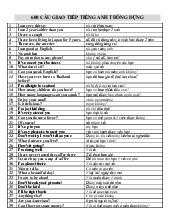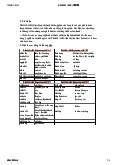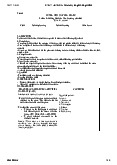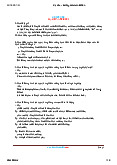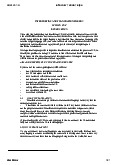





Preview text:
Họ và tên: Lớp: MSV:
HỌC VIỆN NGOẠI GIAO
ĐỀ THI CUỐI HỌC KỲ II KHOA TIẾNG ANH
NĂM HỌC: 2021-2022 KHÓA: …..
TIẾNG ANH CHUYÊN NGÀNH 1 Kỹ năng: Đọc hiểu Thời gian: 90 phút
(Sinh viên được sử dụng từ điển đơn ngữ)
TikTok May Be More Dangerous Than It Looks
By Ezra Klein, retrieved from The New York Times
TikTok, as we know it today, is only a few years old. But its growth is like nothing we’ve seen
before. In 2021, it had more active users than Twitter, more U.S. watch minutes than YouTube, more
app downloads than Facebook, more site visits than Google. The app is best known for viral dance
trends, but there was a time when Twitter was 140-character updates about lunch orders and Facebook
was restricted to elite universities. Things change. Perhaps they have already changed. A few weeks
ago, I gave a lecture at a Presbyterian college in South Carolina, and asked some of the students where
they liked to get their news. Almost every one said TikTok.
TikTok is owned by ByteDance, a Chinese company. And Chinese companies are vulnerable to
the whims and the will of the Chinese government. There is no possible ambiguity on this point: The
Chinese Communist Party spent much of the last year cracking down on its tech sector. They made a
particular example out of Jack Ma, the high-flying founder of Alibaba. The message was unmistakable:
Chief executives will act in accordance with party wishes or see their lives upended and their companies dismembered.
In August 2020, President Donald Trump signed an executive order insisting that TikTok sell
itself to an American firm or be banned in the United States. By the fall, ByteDance was looking for a
buyer, with Oracle and Walmart the likeliest suitors, but then Joe Biden won the election and the sale was shelved.
In June, Biden replaced Trump’s executive order, which was sloppily written and being
successfully challenged in court, with one of his own. The problem, as Biden’s order defines it, is that
apps like TikTok “can access and capture vast swaths of information from users, including United 1
States persons’ personal information and proprietary business information. This data collection
threatens to provide foreign adversaries with access to that information.”
Let’s call this the data espionage problem. Apps like TikTok collect data from users. That data
could be valuable to foreign governments. That’s why the Army and Navy banned TikTok from
soldiers’ work phones, and why Senator Josh Hawley wrote a bill to ban it on all government devices.
TikTok’s real power isn’t over our data. It’s over what users watch and create. It’s over the
opaque algorithm that governs what gets seen and what doesn’t.
TikTok has been thick with videos backing the Russian narrative on the war in Ukraine.
Media Matters, for instance, tracked an apparently coordinated campaign driven by 186 Russian
TikTok influencers who normally post beauty tips, prank videos and fluff. And we know that China has
been amplifying Russian propaganda worldwide. How comfortable are we with not knowing whether
the Chinese Communist Party decided to weigh in on how the algorithm treats these videos? How
comfortable will we be with a similar situation in five years, when TikTok is even more entrenched in
the lives of Americans, and the company has freedom it may not feel today to operate as it pleases?
Imagine a world in which the United States has a contested presidential election, as it did in 2020
(to say nothing of 2000). If one candidate was friendlier to Chinese interests, might the Chinese
Communist Party insist that ByteDance give a nudge to content favoring that candidate? Or if they
wanted to weaken America rather than shape the outcome, maybe TikTok begins serving up more and
more videos with election conspiracies, sowing chaos at a moment when the country is near fracture.
It is telling that China sees such dangers as obvious enough to have built a firewall against them
internally: They’ve banned Facebook and Google and Twitter and, yes, TikTok. ByteDance has had to
manage a different version of the app, known as Douyin, for Chinese audiences, one that abides by the
rules of Chinese censors. China has long seen these platforms as potential weapons. As China’s
authoritarian turn continues, and as relations between our countries worsen, it is not far-fetched to
suspect they might do unto us what they have always feared we would do unto them.
TikTok’s billion users don’t think they’re looking at a Chinese government propaganda operation
because, for the most part, they’re not. They’re watching makeup tutorials and recipes and lip sync
videos and funny dances. But that would make it all the more powerful a propaganda outlet, if
deployed. And because each TikTok feed is different, we have no real way of knowing what people are
seeing. It would be trivially easy to use it to shape or distort public opinion, and to do so quietly, perhaps untraceably. 2
In all of this, I’m suggesting a simple principle, albeit one that will not be simple to apply: Our
collective attention is important. Whoever (or whatever) controls our attention controls, to a large
degree, our future. The social media platforms that hold and shape our attention need to be governed in
the public interest. That means knowing who’s truly running them and how they’re running them. (837 words) I.
Words and phrases explanation 1. cracking down on
making much unremitting effort to do 2. shelved (bị gián đoạn) 3. data espionage 4.
TikTok has been thick with videos backing the Russian narrative on the war in Ukraine. 5.
abides by the rules of Chinese censors II. Comprehension questions 1.
Why did the Chinese Communist Party make an example out of Jack Ma? 2.
What is the issue with Biden’s rewritten order? 3.
How can Tiktok be used by China for manipulating political views in the US? 4.
How might Tiktok be utilized for Chinese political propaganda? 5.
What proposition has been put forward by the writer? III. Word search 1.
a company that wants to buy another company 2. not transparent 3. settled 4. unlikely 5. unnoticeably – The end – 3 ANSWER KEYS I.
Words and phrases explanation 2 pts each 1. cracking down on
taking tougher actions against 2. shelved
unabled to be proceeded 3. data espionage
spying on sensitive information 4.
TikTok has been thick with videos backing the Russian narrative on the war in Ukraine.
Tiktok has been flooded with videos in view of supporting Russia in the conflict with Ukraine. 5.
abides by the rules of Chinese censors
(Douyin) follows Chinese censorship laws. II.
Comprehension questions 4 pts each 1.
Why did the Chinese Communist Party make an example out of Jack Ma?
This is a warning against business leaders that if they do not comply with their
government’s wishes, their lives will become chaotic and their businesses will be dismantled.
(In-text: The Chinese Communist Party spent much of the last year cracking down on its
tech sector. They made a particular example out of Jack Ma, the high-flying founder of
Alibaba. The message was unmistakable: Chief executives will act in accordance with party
wishes or see their lives upended and their companies dismembered.) 2.
What is the issue with Biden’s rewritten order?
TikTok and similar apps can have access to and record a lot of their users’ personal data,
which may cause damage when providing access to foreign adversaries.
(In-text: The problem, as Biden’s order defines it, is that apps like TikTok “can access and
capture vast swaths of information from users, including United States persons’ personal
information and proprietary business information. This data collection threatens to provide
foreign adversaries with access to that information.”) 3.
How can Tiktok be used by China for manipulating political views in the US? 4
If one of the presidential candidates was more favorable towards China, videos in view of
supporting that candidate will be pushed more on the platform; however, if the Chinese
government wanted to go against the US, there would be more conspiracy videos to cause
unrest when the country is weakening.
(In-text: If one candidate was friendlier to Chinese interests, might the Chinese Communist
Party insist that ByteDance give a nudge to content favoring that candidate? Or if they
wanted to weaken America rather than shape the outcome, maybe TikTok begins serving up
more and more videos with election conspiracies, sowing chaos at a moment when the country is near fracture.) 4.
How might Tiktok be utilized for Chinese political propaganda?
It would be impossible to trace what Tiktok users are watching since each person has their
own personalized feed, therefore Tiktok would be easily taken advantage of to manipulate or alter public views.
(In-text: TikTok’s billion users don’t think they’re looking at a Chinese government
propaganda operation because, for the most part, they’re not. They’re watching makeup
tutorials and recipes and lip sync videos and funny dances. But that would make it all the
more powerful a propaganda outlet, if deployed. And because each TikTok feed is different,
we have no real way of knowing what people are seeing. It would be trivially easy to use it
to shape or distort public opinion, and to do so quietly, perhaps untraceably.) 5.
What proposition has been put forward by the writer?
The public interest needs to properly regulate social media apps that form and retain our
opinions, including determining who is in charge of operating them and how they’re being managed.
(In-text: The social media platforms that hold and shape our attention need to be governed
in the public interest. That means knowing who’s truly running them and how they’re running them.) III. Word search 2 pts each 1. a company that wants to buy opaque another company 3. settled suitor entrenched 2. not transparent 4. unlikely 5 far-fetched 5. unnoticeably untraceably 6
